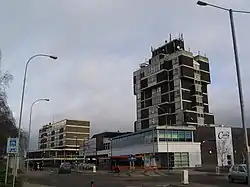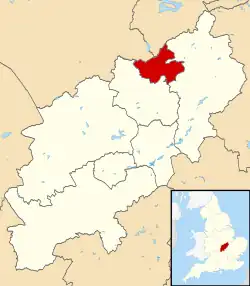Borough of Corby
Corby was a non-metropolitan district with borough status[1] in the county of Northamptonshire, England. It bordered the East Northamptonshire district to the east, the Borough of Kettering to the south and west, the Harborough district of Leicestershire to the north-west, and the county of Rutland to the north-east. In 2021 the district had a population of 75,571.[2] The council, Corby Borough Council was based at the Cube in the town of Corby.[3]
Borough of Corby | |
|---|---|
 Corby town centre | |
 Borough of Corby shown within Northamptonshire | |
| Coordinates: 52.4914°N 0.69645°W | |
| Sovereign state | United Kingdom |
| Constituent country | England |
| Region | East Midlands |
| Non-metropolitan county | Northamptonshire |
| Status | Non-metropolitan district |
| Admin HQ | Corby |
| Government | |
| • Type | Non-metropolitan district council |
| • Borough council | Corby Borough Council ( ) |
| • Mayor | Ray Bebey |
| • MPs | Tom Pursglove (Con) |
| Area | |
| • Total | 31.00 sq mi (80.28 km2) |
| Population (2019) | |
| • Total | 72,218 |
| • Density | 2,300/sq mi (900/km2) |
| Time zone | UTC0 (GMT) |
| • Summer (DST) | UTC+1 (BST) |
| Postcodes | |
| Area code | 01536 |
| ONS code | 34UB (ONS) E07000150 (GSS) |
| OS grid reference | SP897887 |
| Website | www |
Civil parishes

Corby district contained the unparished area of Corby[4][5] and the civil parishes of Cottingham, East Carlton, Gretton, Middleton, Rockingham, Stanion and Weldon.[6]
Wards
Corby district contained the wards of Beanfield, Central, Danesholme, Kingswood & Hazel Leys, Lodge Park, Lloyds, Oakley North, Oakley South, Rowlett, Rural West, Stanion & Corby Village and Weldon & Gretton.[6]
History
The district was formed on 1 April 1974, under the Local Government Act 1972, by a merger of Corby Urban District and part of Kettering Rural District.[7][8] In 1993 it was granted borough status.[9][10]
Abolition
The district was abolished on 1 April 2021 and merged with the East Northamptonshire district, the Borough of Kettering and the Borough of Wellingborough to form the North Northamptonshire unitary authority area.[11]
See also
References
- "The Corby (Electoral Changes) Order 2014 No. 3287". legislation.gov.uk. Retrieved 22 December 2020.
- "TS001 - Number of usual residents in households and communal establishments - Nomis - Official Census and Labour Market Statistics". www.nomisweb.co.uk. Retrieved 14 November 2022.
- "Contact us". Corby Borough Council. Archived from the original on 2 December 2020. Retrieved 22 December 2020.
- "Corby Registration District". UKBMD. Retrieved 20 December 2020.
- "Corby". City Population De. Retrieved 20 December 2020.
- "Corby". Ordnance Survey. Retrieved 20 December 2020.
- "The English Non-metropolitan Districts (Definition) Order 1972". Legislation.gov.uk. Retrieved 16 February 2021.
- "The English Non-metropolitan Districts (Names) Order 1973". Legislation.gov.uk. Retrieved 16 February 2021.
- "History of Corby". Corby Borough Council. Archived from the original on 30 November 2020. Retrieved 20 December 2020.
- "Northamptonshire". Local Government Boundary Commission for England. Archived from the original on 19 October 2021. Retrieved 23 December 2020.
- "Home". Future Northants North. Retrieved 20 December 2020.